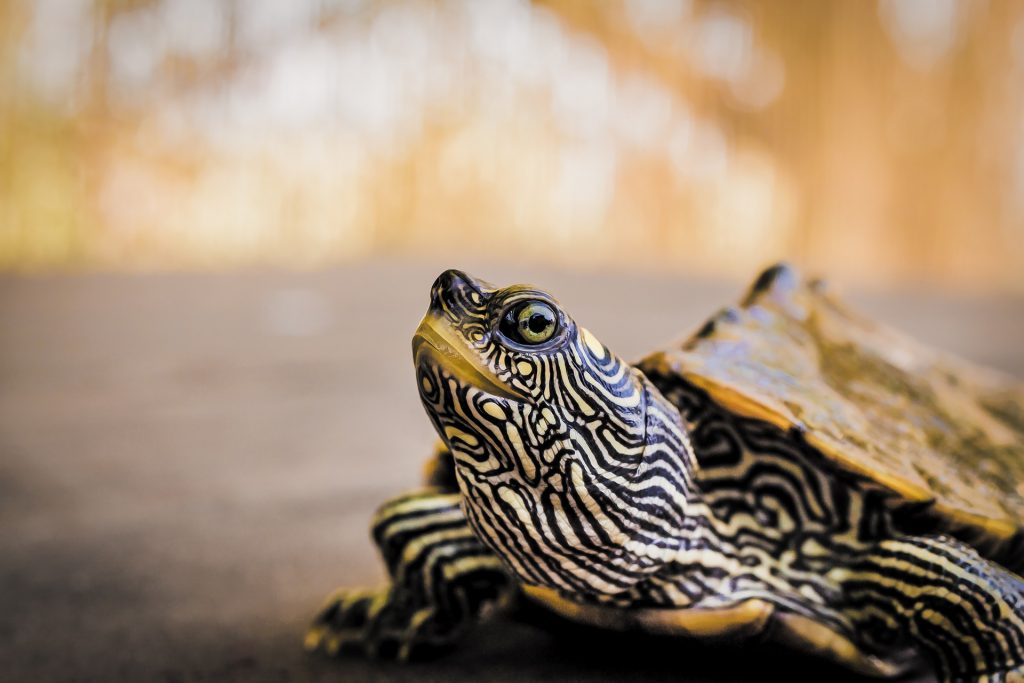All animals have a temperature that is best for them. When it comes to turtles, temperature is even more important because turtles are cold blooded.
To answer the question, yes, turtles do get cold. Fortunately, turtles are cold-blooded and can handle cold weather. They handle temperature drops by lowering their metabolism and not moving. Like most animals, turtles can not make it in extremely cold weather.
Now, there is a lot more to this question than the simple answer provided above. We will discuss some of the finer points of turtles in cold weather.
Why Turtles Get Cold?
Turtles get cold because they are reptiles. Reptiles, for those that do not know, are cold blooded animals.
This means that they cannot regulate their body temperature. Instead, their body temperature is directly related to the outside temperature. If it is hot outside, then a reptile is out. If it is cold outside, then a reptile is cold.
It’s because of this that turtles alternate time between swimming in water and sitting around on land. Basically, turtles swim in the water when they get too hot from sitting outside under the sun.
A fairly simple concept to understand, and a very important one for how to properly take care of a turtle.
The Coldest Temperature a Turtle Can Survive

Turtles can not survive temperatures below freezing. This does not mean that you should keep your turtle in freezing temperatures, though.
This is because turtles actually go into hibernation at cold temperatures. And you probably do not want to have a turtle doing nothing in hibernation for months.
Anyway, the ideal temperature to keep your turtle is around 77° F at the low end and 84°F on the high end. The exact temperature depends on the breed of turtle. 77° to 84° is a good general temperature range.
5 Signs Your Turtle is Cold
You generally don’t want your turtle to be too cold. It is not healthy to have them in cold temperatures for a prolonged period as it can cause sickness. With that in mind, here are some signs that your turtle is cold:
- Your turtle does not move much.
- Your turtle sleeps a lot.
- Your turtle looks tired.
- Your turtle does not eat much.
- Your turtle spends a lot of time out of the water.
- This could also be a sign that your water is too cold!
So, those are three easy signs to spot. In our experience, those are the three biggest signs you will notice. Your turtle might also get sick more often, but sickness in turtles can have a lot of causes.
The symptoms of a cold turtle almost always have one cause… a cold turtle.
Do Turtles Hibernate?
Yes, turtles hibernate in the winter. This is not something you will likely see with your pet turtle. You should keep the temperature warm enough for it to not hibernate.
But your turtle will hibernate if you do not keep the temperature warm.
Do Turtles Get Cold After Dark?
Yes, turtles will get cold at night because there is not any sun. Fortunately, they don’t need much food because they are cold blooded.
What we’re trying to say is that you can turn off your turtle’s heater/light at night. In fact, keeping the heat source on can negatively impact your turtle because it does not properly mimic nature.
It’d be the equivalent of a human living somewhere where the sun never set – not too comfortable!
Check Out Our Other Articles About Turtles:
Furthermore, wild turtles have a tendency to bury themselves to retain some heat. Some heat will make it easy for the turtle to wake up in the morning. So, if you want to make your turtle the most comfortable possible, then leave some leaves around and have some dirt for the turtle to burrow.
Do Water Based Turtles Get Cold?
Yes, aquatic turtles also get cold. They too are cold blooded reptiles that cannot regulate their body temperature.
The main difference is that aquatic turtles (obviously) spend a large portion of their life in the water. This means that they cannot simply jump out of the water when the water gets too cold.
Instead, aquatic turtles move from cold water to warm water when they feel cold. They also have a much wider temperature range than land turtles.
That said, they will still sit on a rock or log in the sun when the water makes them feel too cold.
Aquatic turtles will also hibernate during the winter. And yes, aquatic turtles hibernate underwater. Water has a much more stable temperature than anything they could experience outdoors. Turtles can absorb dissolved oxygen through their skin, so they have no problem breathing.
The only issue an aquatic turtle might have hibernating is if the pond they’re in freezes. In that case, the turtle will have some problems.
Anyway, your pet aquatic turtle will not go into hibernation if you keep the water temperature. You do not want your pet turtle hibernating because, well, it’s boring. Just make sure to keep the water temperature warm enough to prevent your turtle from hibernating.
Final Thoughts
That covers it for whether or not turtles can get cold.
Yes, turtles will get cold in cold weather. They are a cold blooded animal and cannot regulate their body temperature. If a turtle gets too cold, then it will go into hibernation.
You generally want to avoid that with a pet turtle, so make sure to keep your turtle’s living environment warm.